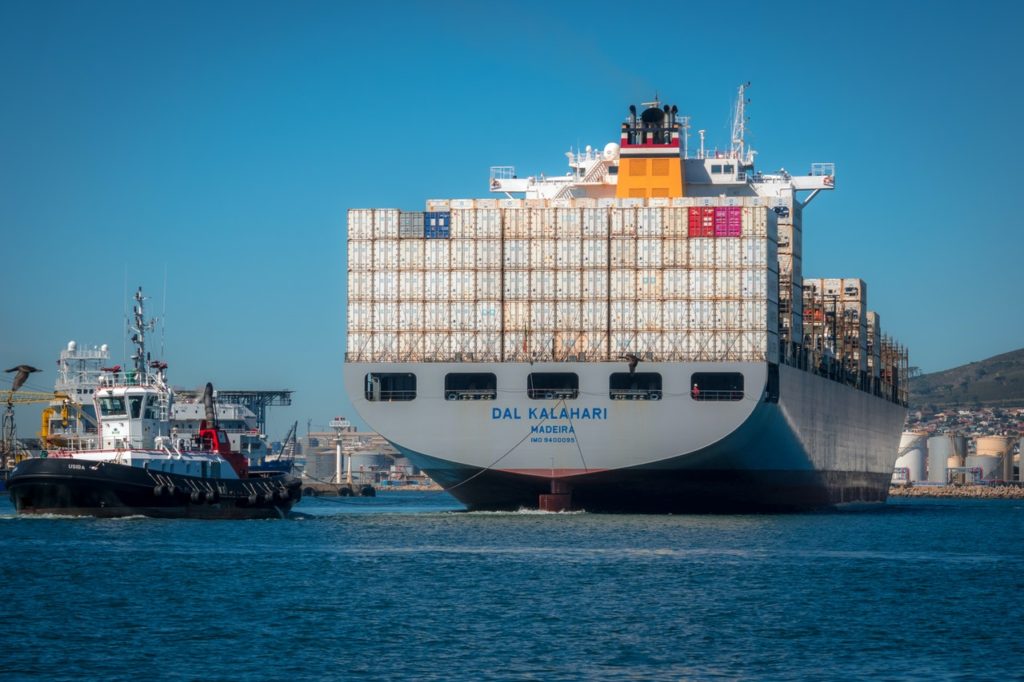
I learned this today. Ships float because the density of the total volume of the ship is less than the density of the same volume of water it displaces.
An object will float on a liquid if it is less dense than the liquid it is floating on. The density of water is 997 kg/m3. That means anything that is less dense will float. Pine has an average density of about 600 kg/m3, so it floats on water. Lead has a density of 7879 kg/m3, so it sinks in water.
Objects can be denser because they have more atoms in the same space; the atoms in them could be smaller, so more fit into the same space; the atoms might be closer to each other, so more can fit into the same space.
When you put an object in water, gravity acts to pull the object down. At the same time, the water pushes up on the object, this is called buoyancy. The object that you put into the water displaces water to make space for itself. The object displaces water that is equal to its own volume. This is where the density comes in.
If the weight of the object is less than the weight of the displaced water, the force pushing it up will be stronger than the force pulling it down and it will float. If the object placed in the water weighs more than the water it has displaced, the pull of gravity will be stronger than the push of the water and it will sink.
1 liter of water has a density of 1 kg. If you put a kilogram of lead in the water, it will displace its volume of water. Lead is very dense, so a kilogram of lead is 88cm3, which is 0.09L. That means the lead has displaced 0.09 kg of water. The lead weighs 1kg, which is more than 0.09kg, so it sinks. If you put 1kg of cork in the water, it is much less dense and will have a volume of 4,200cm3, which is 4.2L. The cork will displace 4.2kg of water. The 1kg of cork weighs less than the 4.2kg of water pushing against it, so it will float.
Boats float by employing this principle. They are huge, but they are not very dense because they have huge air pockets inside them. The biggest ship in the world is the Prelude. It was launched in 2013 and is 488m long. It is a floating natural gas platform, and it weighs 300,000 tons when full. You would think that something that heavy would sink straight to the bottom of the sea. However, it doesn’t because of physics. The ship has a volume of 600,000,000L. It displaces 600,000,000kg, 600,000 tons of water. The force pushing back on the ship is 600,000 tons, which is more than the 300,000 tons being pulled down by gravity, so the ship floats.
Ships sink when this ratio is upended. The Prelude will have bulkheads inside it. These are watertight sections that can flood if the ship is damaged. They are sealed off from each other so only the bulkheads connected to the damaged part of the ship can flood. If a few bulkheads flood, it will push out the air and raise the density of the ship, but the ship can still float if its overall weight is lower than the weight of water pushing back on it. If enough bulkheads flood to make the ship heavier than the water pushing back on it, it will sink.
This is what happened to the Titanic. It had bulkheads, but they were not sealed at the top. If they had been watertight, the few that were near the iceberg-damaged area would flood, but the ship would still have been able to float. Because they were not sealed at the top, water rushed over into the next bulkhead, filling all of them, and making the ships weight more than the force of the water pushing back on it. And the Titanic sank.
So, ships float because their large volume and huge air spaces mean they are less dense than the water. They displace their volume in water, which pushes back up on the ship. The ship weighs less than the weight of the water pushing back on it, so it floats. If the ship floods and fills with water, it will weigh more than the water pushing back on it and it will sink. And this is what I learned today.
Source
https://letstalkscience.ca/educational-resources/stem-in-context/why-do-ships-float
https://www.wonderopolis.org/wonder/how-do-boats-float
https://davidson.weizmann.ac.il/en/online/askexpert/why-do-ships-float

Pingback: Why is gold so rare? - I Learned This Today